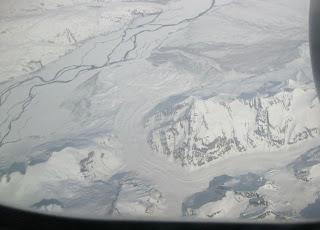 |
| Judge Matthews, Mayor Cremata, Attorney Brena |
We're onto the Skagway case now. They don't like that their house district pairs them with the Mendenhall Valley part of Juneau instead of downtown as they are now in their present district.
We heard the Mayor of Skagway, Andrew Cremata, Brad Ryan, Borough Manager Municipality of Skagway Borough, and John Walsh, lobbyist for Skagway.
Basically they all made the same argument:
Skagway's interests are very closely tied to downtown Juneau with whom they've shared a district these last ten years. Those interests are most strongly connected by the fact that the cruise line industry has a huge economic impact on both communities. Mayor Cremata pointed out that the long term lease of Skagway's port ends in March and Skagway will soon own and control the port. He emphasized how important it has been to be able to work closely with the port people in Juneau in planning funding for expanding the port and dealing with the infrastructure needs of having so many passengers disembark downtown. He mentioned they had to build Skagway's first crosswalk. Skagway's all year round population is about 1000 and it triples when a ship comes in.
In addition to the socio-economic relationship with downtown Juneau because of the port, the witnesses testified that all the services Skagway government, businesses, and citizens use are in downtown Juneau -engineers, doctors, dentists, lawyers, shopping, government offices, and on and on.
The Board's attorney, Singer, eventually gave up asking about connections the Mendenhall Valley Skagway (and Haines and Gustavus) residents have - hammering on the fact that the ferry terminal is in their new district. They replied that the terminal is just a stop on the way to Juneau and pointed out that the airport is part of the downtown district.
His next tack was to keep saying that all of Juneau borough is socio-economically integral because it's all in the same borough.
It went on and on with examples of what specific things Skagway and downtown Juneau have in common and how little sense it makes to split the Valley in half to put Skagway there instead.
Skagway is up against the ruling that every place within Borough boundaries is socio-economically integrated. On the other hand, Skagway is outside the Borough boundaries. The issue is to convince the judge and then the Supreme Court that they are more SEI with one part of Juneau than the other.
Judge Matthews at one point asked John Walsh, the lobbyist, if the downtown Juneau legislator was already an enthusiastic supporter of Skagway's interest, wouldn't it be better to have two legislators instead of just one.
 |
| Skagway lobbyist Walsh and Board Attorney Singer on right |
Walsh said that it was a presumption the Valley legislator would work hard for Skagway's interests, but it might work out. If not they would have to find support elsewhere, like Ketchikan (also a cruise line port of call.) He was worried a Mendhall legislator would have maritime interests and wouldn't have the urgency a committed legislator would have.
Then Matthews followed up asking if the Mendenhall legislator would be opposed to Skagway's interests or just less interested in them? The latter, was the response
Skagway's argument is similar to Valdez' argument that being paired with downtown means they have more clout in the legislature. Except in the Valdez case, they didn't just argue they'd have more clout with communities along the pipeline corridor. They also showed that they were actually in competition with Mat-Su on some very significant issues.
While Skagway said a Mendenhall Valley rep wouldn't know their issues as well and thus wouldn't represent them as well, they didn't show any actual competing interests with the Valley. I'd note that Brena is the attorney for Valdez and for Skagway.
Singer, the Board's attorney, might point out that in the Valdez case, they argued that the Valdez port was in competition with the Mat-Su port, but in this case he's saying both having ports gives them a common interest. I imagine Brena's response would be that it's a very different situation. Mat-Su would be competing for the cargo shipping to the interior that Valdez currently has, and can put that cargo on a train rather than the road.
But in the case of Skagway and Juneau, they are on the same cruise ship tour route so they aren't in competition. They can work together as Alaskan ports for better port management and to learn from each other. What wasn't mentioned was teaming up to get better terms from the cruise lines.
Though no one made that argument and my suspicion is they are all very cosy with the cruise lines and that Skagway is making enough revenue from the cruises they are willing to give up the small town quaintness that makes Skagway a good place to live (and for cruise lines.) While the mayor talked about all the impacts of the cruise line passengers - need for more infrastructure to handle them, more police, more fire fighters, more roads, more health care, more housing - he didn't say anything negative about that kind of growth. Only that they needed to work with Juneau to learn how to handle it.
Tomorrow Board member Budd Simpson will be testifying. He's from Juneau and drew the map. Brena said he'll need a lot of time with Simpson.
















































